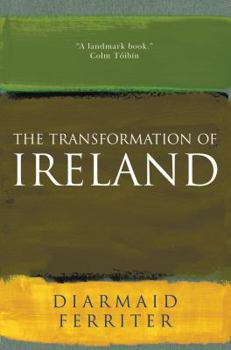The Transformation of Ireland
Select Format
Select Condition 
Book Overview
A ground-breaking history of the twentieth century in Ireland, written on the most ambitious scale by a brilliant young historian. This description may be from another edition of this product.
Format:Hardcover
Language:English
ISBN:1585676810
ISBN13:9781585676811
Release Date:November 2005
Publisher:Harry N. Abrams
Length:884 Pages
Weight:2.75 lbs.
Dimensions:2.2" x 6.3" x 9.2"
Customer Reviews
2 ratings
Weighty but never ponderous: 20C Ireland's arc
Published by Thriftbooks.com User , 18 years ago
A lecturer at St Patrick's College, Dublin City University, Ferriter, barely in his mid-thirties, has produced a massive compilation of Ireland's 20th century worthy of a professor's lifetime's worth of research and reflection. The fault with this book is its abundance of riches: the level of detail combined with the breadth of topics creates a volume overwhelming the casual reader in its heft. In 760 pages of text (and another 120 adding citations, a bibliography, and index), Ferriter combines his own interpretations of Irish historiography with a survey of past historical study- along with many primary sources from archives, novels, biographies, journalism and memoirs. Ferriter largely builds upon Joe Lee's Ireland 1912-85, often commenting upon Lee's findings before adding his own qualifications. In his introduction, Ferriter explains that due to the rapid changes in the past twenty years, another look at Ireland's momentous shift from First World location with Third World subsistence economy, hero worship, and clerical ethos to the current more multicultural, liberalised, and secularised consumer culture impels his investigation. Ferriter listens to the famed and the nearly anonymous and gives all ample hearing. He avoids grandstanding or polemic even in such treacherously tempting areas as republicanism, priestly scandals, DeValera's visit of condolence to the German Legation after Hitler's death, feminism, or the constant blaming by so many of his countrymen of all their problems on England-even as they often rushed eagerly into its hearty embrace for employment, emigration, and entertainment. Tom Garvin, paraphrased by Ferriter, teaches how an Irish Republic under DeValera could be revolutionary and reactionary. Those who led it grew up in Edwardian years, full of nationalist yet anti-modern romanticisation of a return to a rural and aesthetic purity. `They rebelled against their elders but, according to Garvin, were sceptical about the possibility or desirability of mass democracy.' (76) Sharing newer findings by historians such as Patrick Maume, David Fitzpatrick, and Peter Hart, Ferriter agrees that clerical conformity guided the rebels along a small-town, `middle-agrarian' perspective often angled oddly against the urbanised cadre that comprised so many of the lower ranks of the IRA. In his narration of the wars, Ferriter remains fair-minded. Page 234 quotes a Limerick monsignor's witnessing of a Black and Tan atrocity; page 235 informs us that one of those labelled as `agents' killed the morning of Bloody Sunday 1920 was a member of the Veterinary Corps sent over to buy mules for the British army- whose second cousin was Michael Davitt. Fratricidal mayhem expressed pithily. Ferriter shares the dreams of those out in `16 and after without glossing over the hard-headed realism of those with whom they shared bed and board. Seán Ó Faoláin's autobiography Vive Moi! is used well: in it, Séan recounts how his wife Eileen told him and h
a majestic work
Published by Thriftbooks.com User , 18 years ago
Much of Irish written history speaks to particular, individual events, esp. of the last century: Easter 1916; the war for independence and the civil war that followed; the Troubles that followed those, starting in 1968 or so; the autobiographical accounts of poverty and struggle threaded amid that. What is harder to explain is how Ireland went, from 1900 to 2000, from political and religious oppression to a vibrant and open society, from destitution to the "Green Tiger" economy, from a struggle for political freedom to one for personal freedom. Mr. Ferriter has provided a broad social history that speaks to that. Although the political struggles are mentioned, he explains their impacts, not simply the chain of events. More importantly, he puts those events in context. The footnotes and bibliography show considerable breadth and depth of research; the prose is straightforward. Very worthwhile for anyone interested in Ireland. As a masterwork of history this is worth comparing to other recent work on other histories, to the likes of, e.g., James McPherson's treatment of the American civil war (Battle Cry of Freedom), or Tony Judt's look at recent Europe (Postwar), as broad-canvas history that does not neglect the social changes or the people caught up in the times. It's a good trend and Mr. Ferriter seems to be in the front rank.





